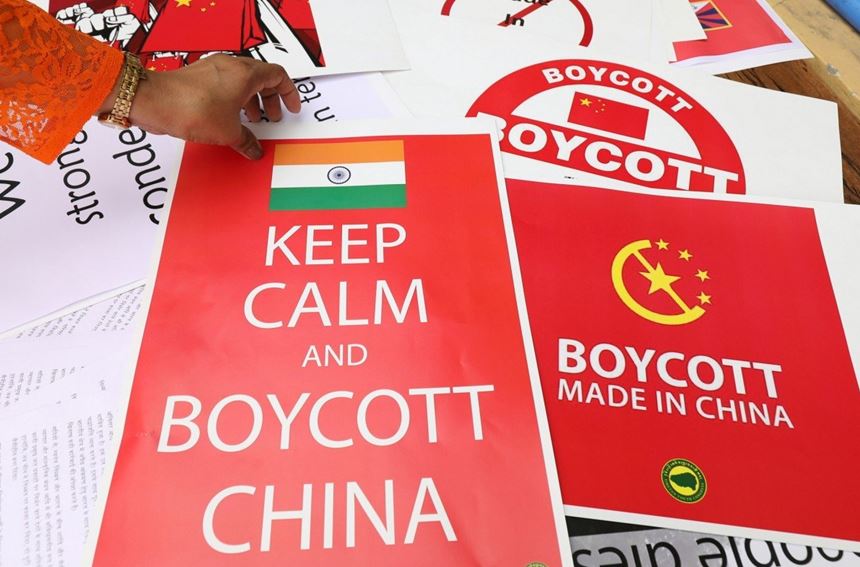Chinese companies are increasingly feeling the heat of growing anti-China sentiments in India, particularly after the brutal clash between Indian and Chinese soldiers at the Galwan valley. Calls of boycotting Chinese products and companies with ties to China are increasing within India, and while many might be pessimistic about the feasibility of such calls, Chinese companies like Realme, Xiaomi and Oppo are running from pillar to post to ‘Indianise’ themselves. By doing so, they are aiming at evading public fury and a radical drop in sales, however, they have been caught red-handed trying to fool Indians.
Realme is essentially a Chinese company, however, that did not stop Realme India CEO, Madhav Sheth from lying about the company in fact being an “Indian start-up”. It is not a tough task uncovering the truth, however. As a matter of fact, until 2018, Realme was a sub-brand of Oppo, another Chinese major company. In 2018, although it separated from Oppo, it till date continues to be functional under a company called BBK Electronics Corporation, which is a Chinese multinational tech conglomerate. In spite of such facts being out in the public domain, for the CEO of Realme India to claim that the company is an Indian start-up goes on to show the desperation of China-based firms. Sheth also went on to explain how the company had created 7,500 jobs for people of Greater Noida through its manufacturing facility.
On Wednesday, Oppo, a highly popular Chinese smartphone brand in India was scheduled to launch its new Find X2 smartphone models in the country via a live video link. The launch, which incidentally was scheduled a day after news of the violent clashes at Galwan valley broke, was cancelled without any prior notice, and the smartphone major instead uploaded a 20-minute video as a substitute to the live-launch of the phone series. This particular pre-recorded video also showed how the Chinese company had helped India fight the Coronavirus pandemic.
Xiaomi, a brand that has come to become a common name for India’s youth, particularly, also had its Indian head, Manu Kumar Jain argue that the company was “more Indian” than any other smartphone firm in the country. He went on to explain how Xiaomi’s products were ‘Made in India’ and how also the company employed over 50,000 people in the country. That the entire leadership team of the company is Indian and that the company pays its taxes in India, were among the other reasons given by Jain to distance and insulate the Chinese company from growing anti-China sentiments in India.
We are more Indian than anyone else.
📱 R&D center/product team is in India
🏭 Our phones & TVs are #MadeInIndia
👫 Entire leadership team is Indian
👩🔧 Employ 50,000 people in India
💵 Pay taxes in India; invest back in India#Xiaomi ❤️️ #India 🇮🇳 #ProudIndian #MakeInIndia https://t.co/6SxFawYoHM— Manu Kumar Jain (@manukumarjain) June 20, 2020
What is, therefore, being seen is that various Chinese companies are trying to brand themselves as Indian ones. While they make a complete fool out of themselves in doing so, since the presumption obviously is that the majority of Indians will fall for such propaganda, the larger point must not be missed. Indians are making China and its companies, which send Indian data and money to China, feel the heat, and the monetary pinch too, though this is just the beginning.
Even globally, Chinese companies and apps are reeling under excessive pressure and scrutiny. This had led to TikTok making cosmetic changes, such as shifting the bulk of its operations to the United States and roping in of Kevin Mayer, the former streaming chief at Walt Disney. TikTok is working on a war-footing to do an image makeover for itself. With each passing day, the executives seem to be realizing that abandonment of all Chinese connotations is what will be their last resort at surviving.
In India, there is an attempt by China-based companies to identify themselves as Indian, to escape the growing wrath of Indian consumers, who are more than willing now, than they ever were, to teach China an economic lesson. Their attempts at ‘Indianising’ themselves are out for all to see, and such companies and their pusillanimous CEOs are fooling nobody.
